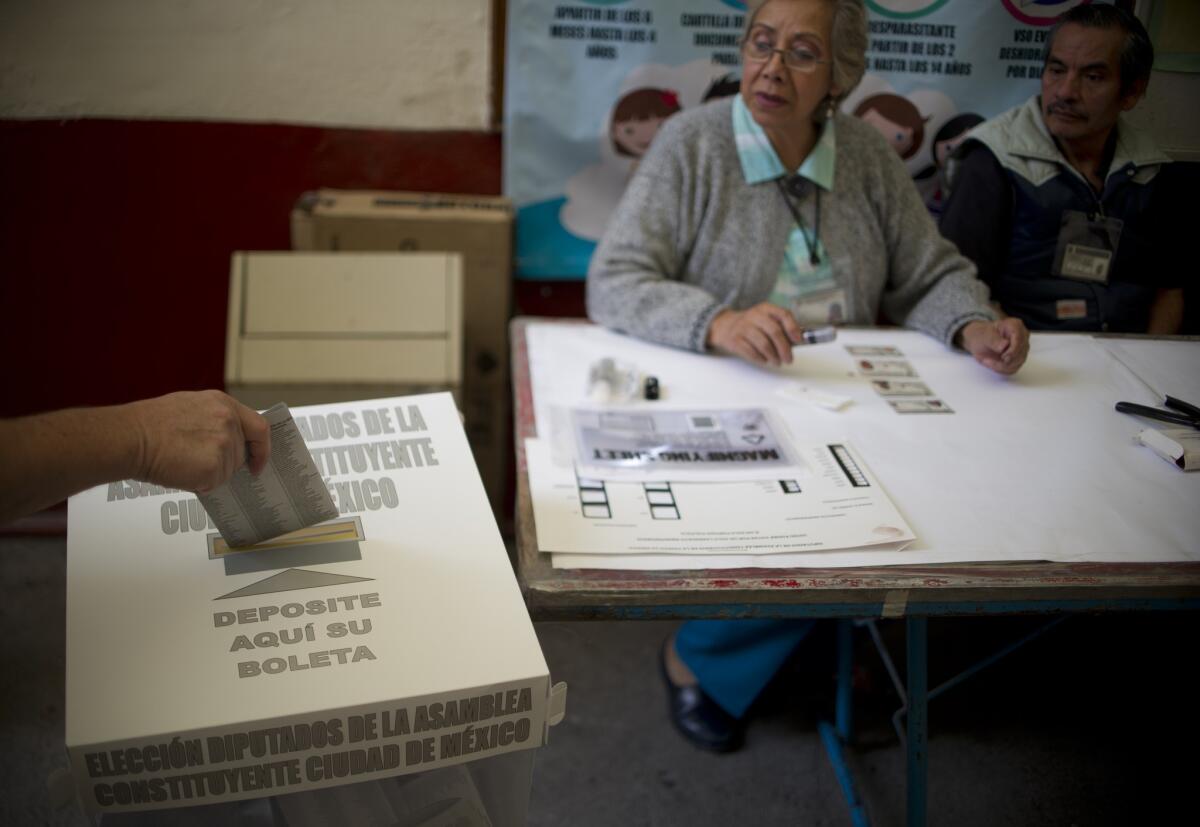Major election losses could threaten ruling party’s grip on Mexican presidency

A polling place in Mexico City on June 5, 2016. The results of the local elections are widely viewed as a broad rejection of the ruling Institutional Revolutionary Party.
Reporting from MEXICO CITY — Mexico’s ruling Institutional Revolutionary Party was headed toward a crushing setback in local elections, according to nearly complete vote tallies released Tuesday, raising questions about its ability to retain the presidency in two years.
Known as the PRI, the party came into the elections Sunday holding nine of the 12 governor seats that were up for grabs. It is set to come away with only five of those seats, the results showed.
Its chief rival, the conservative National Action Party, or PAN, appears to have won the governor’s offices in the other seven states, including three in a strategic alliance with the left-leaning Democratic Revolution Party, according to the near-complete returns.
The results — from states that are home to slightly less than one-third of the Mexican population — await final certification by Mexico’s National Electoral Institute.
Significantly, the count showed the PRI losing the two most closely watched governor’s races — in the violence-racked gulf states of Veracruz and Tamaulipas. The PRI had never lost either of those states.
The results were widely viewed as a broad rejection of the PRI at a time when polls show that its standard-bearer, President Enrique Peña Nieto, is suffering from low approval ratings because of a sluggish economy and widespread discontent with violence and corruption.
“The local voters clearly said ‘enough’ with the bad state governments characterized by … abuse of power, insecurity, and, above all, corruption,” wrote Leo Zuckermann in a column in Excelsior newspaper. “What we are witnessing is magnificent: I would characterize it as a second transition of Mexican democracy, that of the local governments.”
The PRI, which emerged from the tumult of the Mexican Revolution in the early 20th century, ruled the country for decades until it began to suffer defeats in local elections and then lost the presidency in 2000 to the PAN.
Peña Nieto won back the presidency for the PRI in 2012. But observers said Sunday’s results do not bode well for the PRI in the presidential balloting scheduled for 2018.
“The PRI will arrive weak to 2018,” Enrique Krauze, a political analyst, wrote in El Universal newspaper, accusing the party of acting with “indifference” toward corruption and violence.
However, others pointed out that Sunday’s elections largely reflected the realities in certain states, and may not be direct harbingers for the 2018 presidential voting.
“This does not guarantee what is going to happen in 2018 because these are local elections that have a logic distinct to national elections,” Jose Antonio Crespo, a political analyst, said in a telephone interview.
Even after Sunday’s setbacks, the PRI remains the major political force in the national legislature and holds governor’s seats in at least 16 of the country’s 31 states and the federal district of Mexico City, far more than any other party. And the PRI retains an unrivaled electoral machine capable of bringing out the vote, sometimes in exchange for gifts, cash or jobs.
On Monday, in the aftermath of the vote, Peña Nieto issued a statement saying that “those who compete in democracy know that they can win or lose. While some are euphoric today, others are sad or in reflection.”
The opposition PAN, which has been suffering from internal divisions, declared that it was back and on track to regaining the presidency in 2018.
“This is a historic victory,” the party’s president, Ricardo Anaya, told a radio interviewer, noting that the PAN had never won more than three governor’s seats in a single election. “I am convinced we are proceeding firmly in 2018 to [win] the presidency of the republic.”
The backlash against an entrenched PRI leadership was most dramatic in Veracruz, an oil-rich state of 8 million people.
The current PRI governor, Javier Duarte, became a symbol of official impunity in a state where deadly violence linked to drug trafficking and gangs went unchecked and critics alleged rampant corruption.
Veracruz’s apparent governor-elect, Miguel Angel Yunes Linares of the PAN-led coalition, pledged during his campaign to seek criminal charges against Duarte and his associates. He also accused the ruling party of launching a “dirty war” to diminish his candidacy.
With almost 97% of the vote in Veracruz counted, Yunes Linares had won 34.4% of the vote compared to 30.5% for his PRI rival, Hector Yunes Landa, who is also his cousin. Landa’s opponents had accused him of making a secret deal not to investigate Duarte if elected.
Cuitlahuac Garcia, the gubernatorial candidate for the relatively new National Regeneration Movement, known as Morena, was holding 26% of the vote.
While not winning any states, Morena hopefuls did well in a number of local elections, including in Mexico City, where voters chose members of an assembly to write a new local constitution.
Analysts said Morena’s showing could boost the party’s leader, Andres Manuel Lopez Obrador, a former Mexico City mayor who has twice lost the race for president. He has indicated his intention to run for president again in 2018 as the vanguard of the left.
Discontent with violence and corruption was also evident in Tamaulipas, the northern border state that is a stronghold for drug trafficking. Two of its former governors have been indicted in the United States on money-laundering charges and are fugitives from U.S. law enforcement.
With 95% of the ballots counted in Tamaulipas, the PAN candidate, Francisco Javier Garcia Cabeza de Vaca, a federal senator, had won 50.1% of the vote. His rival, Baltazar Hinojosa of the PRI, trailed with 36%.
Times staff writer McDonnell reported from Panama City and special correspondent Sanchez from Mexico City.
More to Read
Sign up for Essential California
The most important California stories and recommendations in your inbox every morning.
You may occasionally receive promotional content from the Los Angeles Times.









